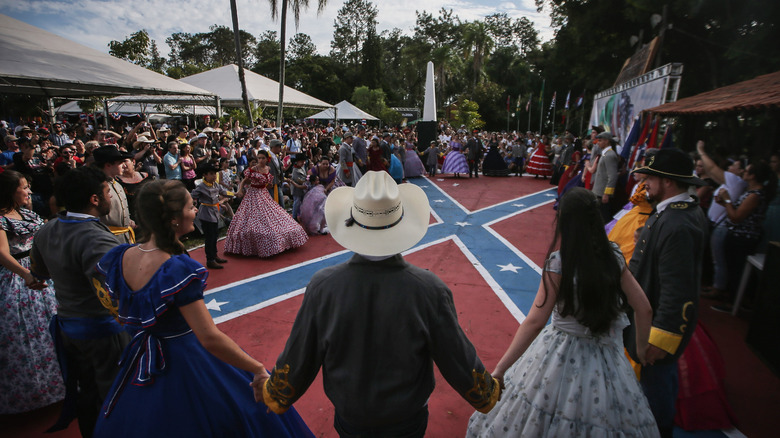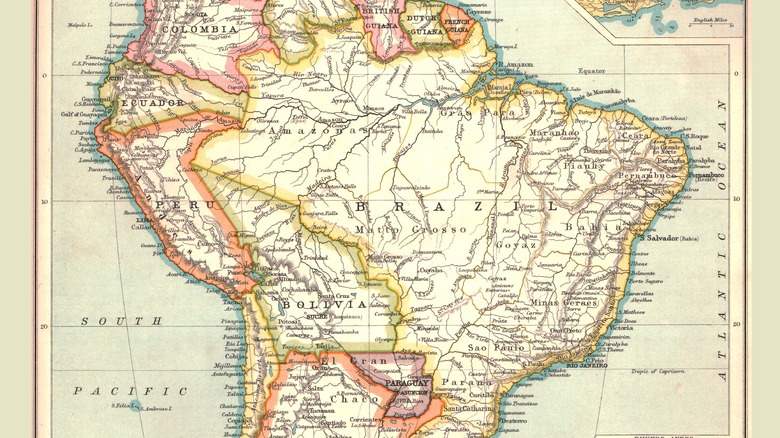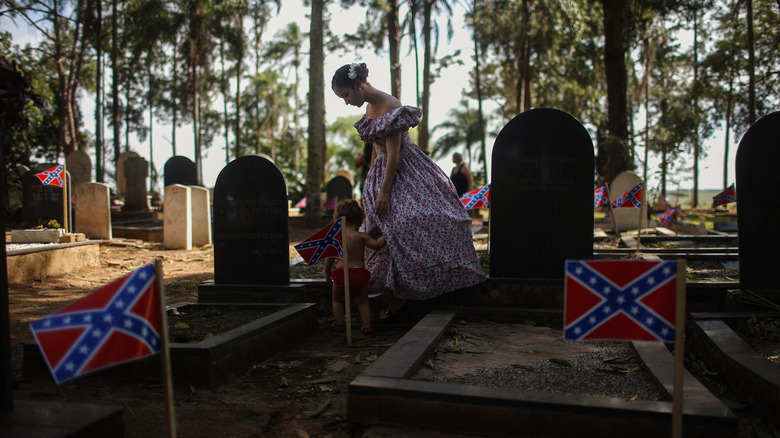Here's Why Brazil Holds An Annual Festival Celebrating The US Confederacy
The historical purpose and nature of the American Confederacy are unambiguous. From its founding documents to its now-infamous flag, the Confederacy repeatedly declared it existed to continue the enslavement of Blacks and maintain the social order of white racial dominance.
The Declaration of Causes of Seceding States, for instance, were written when Southern states broke away from the Union in 1861 (via American Battlefield Trust). They all focused squarely on slavery and Blacks. Mississippi's stated: "Our position is thoroughly identified with the institution of slavery– the greatest material interest of the world... A blow at slavery is a blow at commerce and civilization... There was no choice left us but submission to the mandates of abolition, or a dissolution of the Union." Slavery was under threat, and a great fear existed that "[The Union] advocates negro equality, socially and politically."
The Vice President of the Confederacy, Alexander Stephens, said in a speech that the new nation's "foundations are laid, its corner-stone rests, upon the great truth that the negro is not equal to the white man; that slavery subordination to the superior race is his natural and normal condition" (via Teaching American History). Similarly, the second national flag of the Confederacy, which incorporated the stars and bars of a Virginian battle flag, was said by its designer to represent "the Heaven-ordained supremacy of the white man over the inferior or colored race" (via The Los Angeles Times).
Yet many white Americans still speak favorably of the Confederacy, or display its flag on their shirts and vehicles. One may not find this strange — lack of education, racial prejudice or apathy, a mental divorce from historical meaning, and other factors explain it. But what is truly bizarre is that thousands of miles away, in a city in southern Brazil, a huge Confederate-themed celebration occurs each and every year.
Confederate Exiles and Their Descendants
In Santa Barbara D'Oeste, Brazil, a city of nearly 200,000 people, descendants of Confederate soldiers, politicians, and sympathizers who fled the United States after the Civil War ended gather annually for a grand festival.
According to the BBC, some 10,000 Confederates left the United States for Brazil after the Union victory. They became known as the "Confederados." The Brazilian emperor Dom Pedro II, a supporter of the Confederacy during the war and head of a nation with legalized slavery, encouraged this migration (via The New York Times). He offered cheap land and an escape from the economic ruin of the South, and opened the door to again owning slaves — which some Southern immigrants took advantage of.
The "Festa Confederada" features Southern costumes, music, food, and dance, with the Confederate flag proudly and widely displayed (via CNN). The band plays "Dixie." The event celebrates and honors those who immigrated, taking place at the cemetery where many Confederate ancestors are buried, according to Reuters. About 2,500 people attend every year. The way many Brazilians in attendance view the event mirrors some modern American attitudes toward the Confederacy.
U.S. and Brazilian Slavery
The general view among festival participants is that Confederate imagery has lost any political or moral meaning in Brazil, according to The New York Times. It merely represents their American ethnic background, which has thoroughly mixed over the generations with Brazilian ethnic groups. Partygoers, like many Americans back in the U.S., either see the Confederate flag as having no meaning related to U.S. slavery in this context, or are unaware of the connotations entirely (via Reuters).
However, the Festa Confederada is falling under increased scrutiny, with a growing recognition of its roots in both U.S. and Brazilian slavery. Not only did the Confederados purchase new Black slaves upon arriving at their new national home, they fought to preserve slavery when Brazil, the largest importer of Black slaves in the Western hemisphere, moved to end it; they even lynched Black Brazilians, carrying over an American tradition (via The New York Times). Confederados wrote happily of the low price of Black slaves and regretfully that they could not import freed American Blacks (via The Washington Post).
Though the organizers of the celebration, of the Fraternity of American Descendants, say it is not going anywhere, some descendants of the Confederados have begun to question the event — and even decided to stay home (via The Washington Post).


